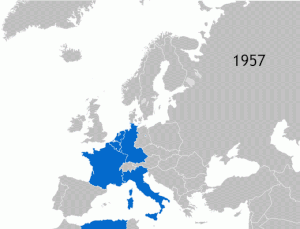Signed in 1992, the Maastricht Treaty established a supranational body comprised of countries, which would be known as the European Union. The Treaty dictates that the Union will help keep peace in Europe and will help facilitate good economic relations amongst member nations. Moreover, it will assert itself as an important body of interdependence. Essentially, the Treaty was signed almost immediately (a year or so) after the fall of the Soviet Union in 1991. Following this logic, it would be reasonable to assume that members would comprise of all regions of Europe. This is a false assumption to make; the Treaty signers were primarily from Western Europe.[1] Founder nations included the likes of Belgium, France, Italy, West Germany, Denmark, the U.K., Spain, and others. It left out much of Eastern Europe, who had just collapsed along with the Soviet Union. In fact, many of these nations would not join until 2004, when ten primarily Eastern European countries joined the European Union. It is questionable to consider why the Treaty was not extended into these nations immediately. Perhaps it had to do with the still lingering fear of communism or the thought that these nations would bring the Union down. Moreover, perhaps the Eastern European nations were still in fear of those leaders in Moscow.
What do you think? Why was Eastern Europe excluded initially from the Treaty of Maastricht and the European Union?
Also, here’s a map:

http://en.wikipedia.org/wiki/File:Member_States_of_the_European_Union_(polar_stereographic_projection)_EN.svg

http://en.wikipedia.org/wiki/File:EC-EU-enlargement_animation.gif
[1] “European Union.” Wikipedia. Accessed April 21, 2015. http://en.wikipedia.org/wiki/European_Union#Member_states.

Tyler, you bring up a good point about who was included in this treaty, or more specifically who was left out. To try to answer your question, I think there was a “once a socialist, always a socialist mentality” partnered with, to quote Sam Huntington a “West versus the rest” approach to international politics.